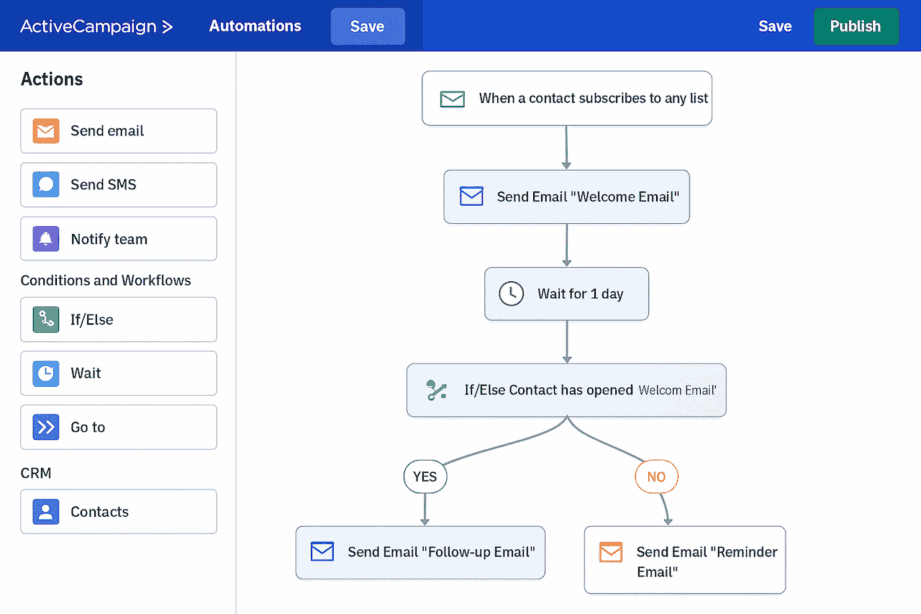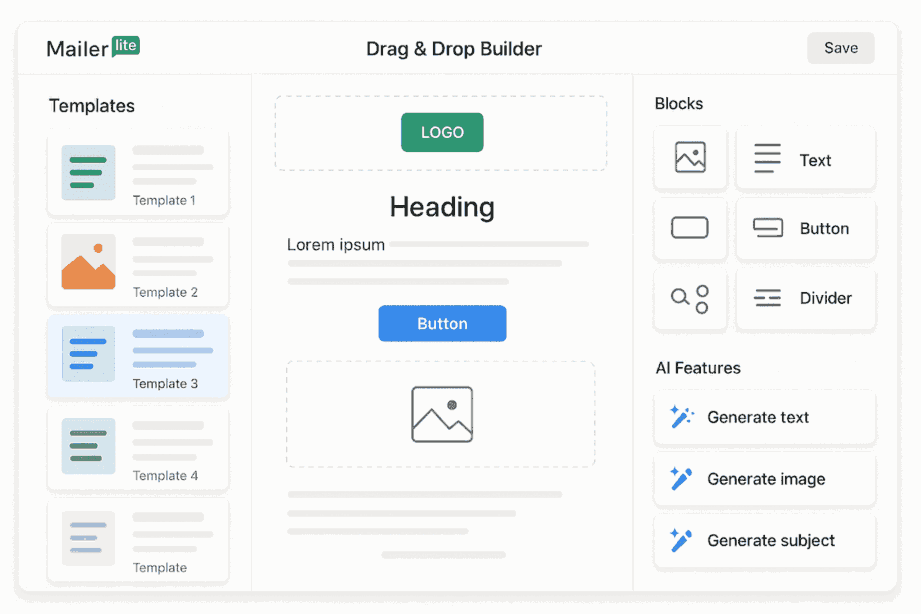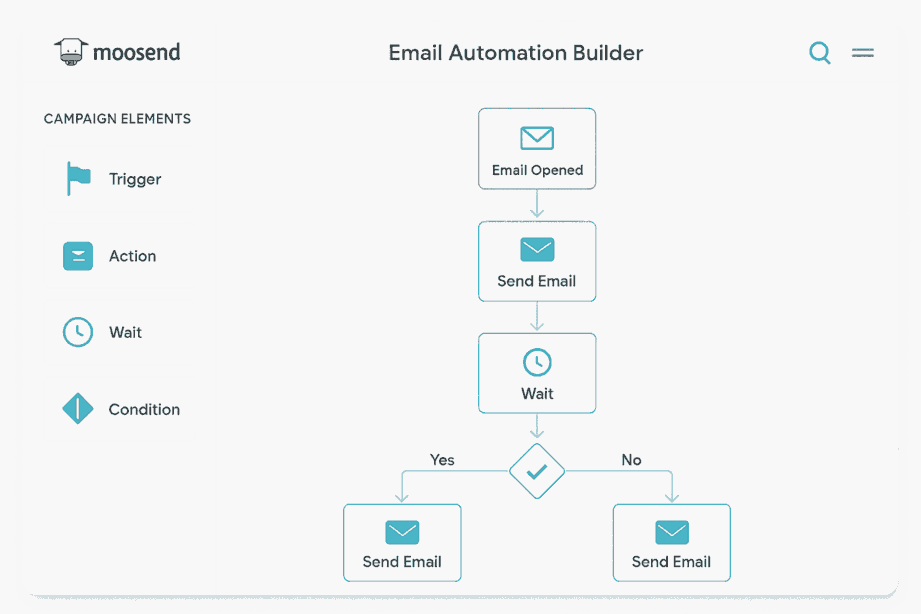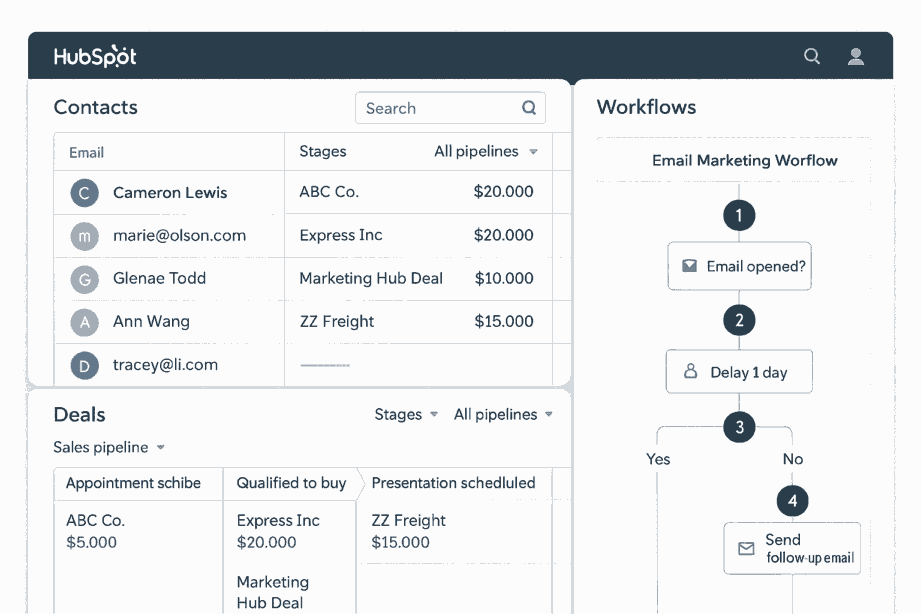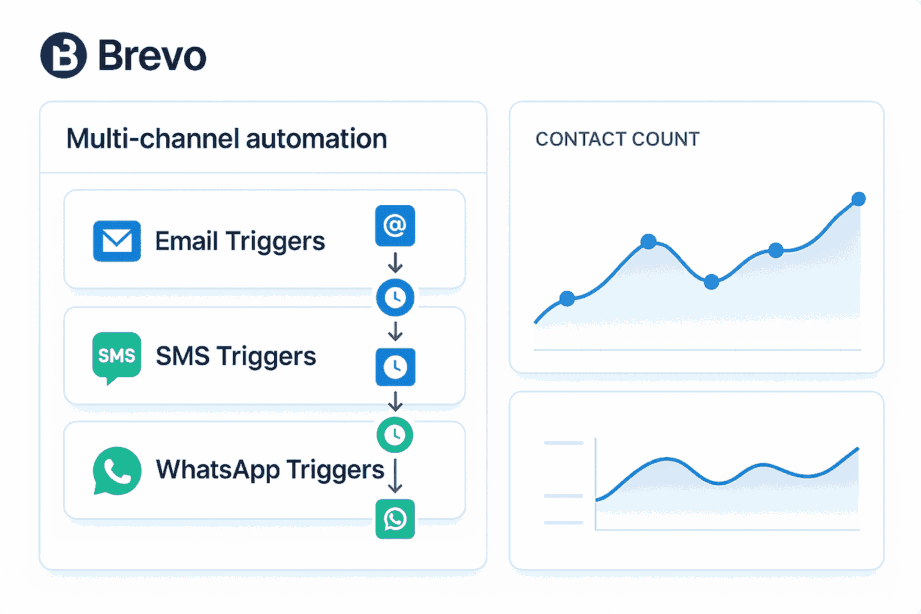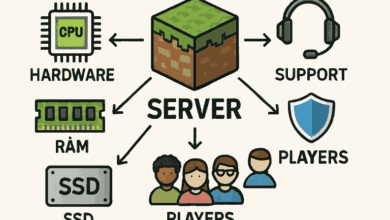17 Best CRM With Email Marketing Software (2025)
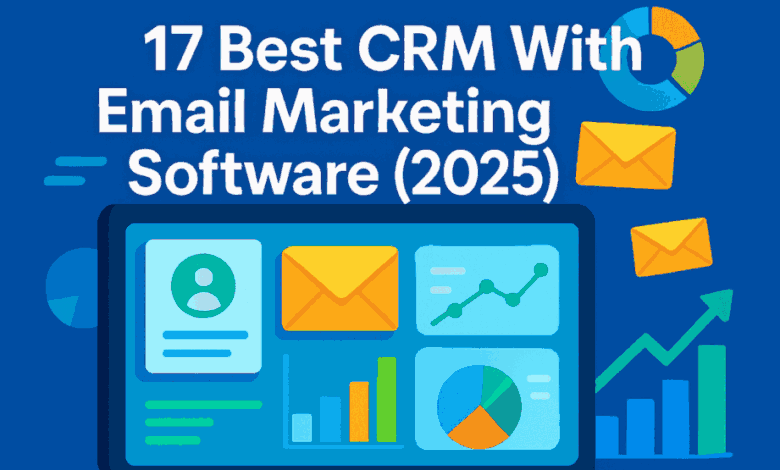
Finding the right CRM with built-in email marketing feels a bit like trying to solve a puzzle where half the pieces look identical. You know you need something that can handle your contacts and send decent emails, but honestly, the options are overwhelming. Perhaps more frustrating is that many platforms claim to do both things well, when really they’re stronger at one or the other.
The truth is, combining CRM and email marketing isn’t just about convenience—though that’s nice. It’s about having your customer data and messaging work together seamlessly, so you can send the right email to the right person at exactly the right moment in their journey. When it works, it’s pretty magical. When it doesn’t… well, let’s just say scattered data and disjointed campaigns are nobody’s friend.
This guide breaks down 17 platforms that actually deliver on both fronts, with real pricing details, feature comparisons, and honest takes on who each tool serves best. We tested automation builders, checked deliverability reputation, and dove into integration capabilities to save you the headache of trial-and-error shopping.
What is CRM with email marketing?
At its core, CRM with email marketing means having your customer relationship management and email campaigns living under the same roof. Instead of juggling separate tools—one for tracking leads, another for sending newsletters—you get a unified system where contact data flows directly into your email strategy.
The integrated approach lets you do things that would be clunky or impossible with separate tools. Like automatically moving someone from a “prospect” email sequence to a “customer onboarding” series the moment they make a purchase. Or segmenting your email list based on deal stage, last interaction date, or custom properties that exist in your CRM.
It’s worth noting that not all “CRM with email marketing” solutions are created equal. Some are really strong CRMs with basic email capabilities tacked on. Others are email-first platforms with lightweight contact management. The sweet spot? Tools that genuinely excel at both, where the integration feels native rather than forced.
Selection criteria
Choosing the right platform comes down to several key factors, though I’ll admit some matter more than others depending on your situation.
Automation capabilities probably top the list. Can you set up complex, multi-step workflows? Does the visual builder make sense, or does it feel like you need an engineering degree? Some platforms excel at simple drip campaigns but fall apart when you need conditional logic or advanced triggers.
Data sync and segmentation matter more than you might initially think. Your CRM data should flow seamlessly into email targeting—no manual exports or messy workarounds. Advanced segmentation based on deal stage, behavior, or custom fields can make or break campaign performance.
Deliverability reputation is crucial but often overlooked until it’s too late. Even the best email content won’t matter if it lands in spam folders. Look for platforms with solid sending infrastructure and reputation management tools.
Pricing structure varies wildly. Some charge per contact, others per user, still others use hybrid models. Pay attention to how costs scale—that $29/month starter plan might jump to $200+ when you hit 5,000 contacts or need a second user.
Native integrations vs. middleware dependency can save you headaches down the road. Platforms with robust native integration libraries typically offer more reliable data flow than those relying heavily on Zapier connections.
The less obvious factors? Mobile experience, reporting depth, and support quality when things go sideways. Because they will, eventually.
Quick comparison table
| Tool | Best for | CRM Features | Email Builder | Automation | Notable Integrations | From Price | Free Plan/Trial |
|---|---|---|---|---|---|---|---|
| ActiveCampaign | Advanced automation | Basic CRM + add-ons | Advanced editor | Complex conditions | 900+ integrations | $15/mo | 14-day trial |
| MailerLite | Simple UI & creators | Contact management | Drag & drop | Visual automations | 130+ integrations | Free/$10/mo | Free plan 1K subs |
| Moosend | Budget automation | Basic contact mgmt | Drag & drop | Visual workflows | 100+ integrations | $9/mo | Free trial |
| HubSpot | Scalability & ecosystem | Full CRM suite | Drag & drop | Visual workflows | 1,000+ native apps | Free/$20/mo | Generous free tier |
| Brevo (Sendinblue) | Budget & high contacts | Basic CRM | Template-based | Multi-channel flows | 150+ integrations | Free/$25/mo | Free plan |
| Pipedrive | Sales-first teams | Strong pipeline CRM | Add-on required | Basic sequences | 400+ via marketplace | $21.90/mo | 14-day trial |
| Zoho CRM | SMB suite integration | Full CRM + AI | Built-in editor | Workflow automation | Zoho ecosystem | Free/$14/mo | Free plan |
| Salesforce | Enterprise extensibility | Industry-leading CRM | Marketing Cloud | Advanced journeys | Massive app ecosystem | $25/mo | 30-day trial |
| Keap | Service SMB automation | Contact + pipeline mgmt | Drag & drop | Campaign builder | 200+ integrations | $249/mo | 14-day trial |
| EngageBay | Budget all-in-one | CRM + marketing + service | Visual builder | Multi-step automation | 1,000+ via Zapier | Free/$14.99/mo | Free plan |
| Freshsales | Sales CRM with email | Deal-focused CRM | Email sequences | Basic automation | Freshworks suite | Free/$15/mo | Free plan |
| monday.com | Workflow customization | Project + CRM boards | Email column add-on | Board automations | 200+ integrations | $12/seat/mo | 14-day trial |
| Nutshell | Simple CRM + drips | Pipeline management | Template system | Email sequences | Gmail/Outlook sync | $19/mo | 14-day trial |
| Insightly | Project-linked CRM | Project + CRM hybrid | Journey builder | Customer journeys | 40+ native integrations | $29/mo | 14-day trial |
| BIGContacts | Ease of use & low TCO | Contact management | Basic templates | Drip campaigns | Email tool integrations | Free/$9.99/mo | Forever free |
| Salesmate | Behavior-based triggers | Visual pipeline CRM | Built-in editor | Event-based automation | 700+ via Zapier | $23/mo | 15-day trial |
| GetResponse | Email-first + CRM | Marketing-focused CRM | Advanced editor | Autoresponder + workflows | 170+ integrations | $19/mo | 30-day trial |
The 17 best CRM with email marketing software
ActiveCampaign — Best for advanced automation
ActiveCampaign’s automation builder is genuinely impressive. Conditional logic, behavioral triggers, and goal-based campaigns feel more sophisticated than most alternatives. If your email strategy involves complex nurture sequences, this platform handles them elegantly.
The CRM functionality is… adequate. Contact management and basic pipeline tracking work fine, but you’ll need paid add-ons for robust sales features. Pipeline management adds $49/month, while full sales engagement tools cost an additional $85+ monthly.
Email creation tools are solid. The drag-and-drop editor is responsive, templates look modern, and A/B testing includes automation variants—not just subject lines. Segmentation options are granular, leveraging both CRM data and engagement behavior.
Pricing starts reasonably at $15/month for 500 contacts but climbs quickly. The Plus plan ($49/month for 1,000 contacts) unlocks most useful automation features, while Pro ($79/month) adds conditional content and attribution tracking.
Read the full ActiveCampaign review
MailerLite — Best for simple UI and creators
MailerLite prioritizes a clean, friendly interface that makes email marketing approachable for creators and small businesses. The drag-and-drop editor is intuitive, with website and landing page builders included—handy for building complete funnels without juggling multiple tools.
The free plan covers up to 1,000 subscribers and 12,000 monthly emails, which is genuinely generous. Paid plans unlock unlimited sends, advanced segmentation, and digital product selling—perfect for creators monetizing their audience directly through email.
Contact management is lightweight but sufficient for most small teams. Basic tagging, custom fields, and simple automation workflows handle common use cases without overwhelming complexity. The automation builder uses a visual approach that feels approachable rather than intimidating.
Templates are modern and mobile-responsive, with decent customization options. A/B testing covers subject lines and content, while the built-in survey tool helps gather subscriber feedback and preferences.
Integration options cover essential tools—WordPress, Shopify, Stripe, and popular apps. The Zapier connection expands possibilities, though the native integration library is smaller than enterprise platforms.
MailerLite works for creators, bloggers, and small businesses that want polished email marketing with minimal learning curve and predictable pricing that won’t spike with list growth.
Read the full MailerLite review
Moosend — Best for budget automation with robust templates
Moosend delivers sophisticated email automation and a generous template library at prices that often undercut bigger competitors. The visual automation builder handles multi-step sequences with conditional logic, behavioral triggers, and advanced personalization—impressive depth for the price point.
Email creation stands out with 100+ professional templates and a responsive drag-and-drop editor. Subject line optimization suggests improvements, while advanced features like RSS-to-email and recurring campaigns save time for content-heavy businesses.
The platform includes landing pages, subscription forms, and basic e-commerce blocks for product recommendations and abandoned cart recovery. Web tracking captures visitor behavior for more precise automation triggers.
Contact management is straightforward—segmentation, tagging, and custom fields work without complexity. The automation templates help teams get started quickly with proven workflows for different business types.
Pricing typically runs 30-50% less than comparable platforms like Mailchimp for similar contact volumes. Annual plans add significant discounts, making it attractive for budget-conscious teams that still want advanced features.
Deliverability is solid, with proper authentication setup and list hygiene tools. Support includes live chat and extensive documentation, though response times can vary.
Moosend suits businesses that want advanced email automation and professional design options without paying premium prices, particularly e-commerce and content-driven companies.
HubSpot — Best for scalability and ecosystem
HubSpot probably deserves its reputation as the “gateway drug” of marketing automation. The free plan is genuinely useful—up to 2,000 email sends monthly, basic CRM features, and forms that don’t look terrible. For small teams testing the waters, it’s hard to beat.
The CRM foundation is solid. Contact management, deal tracking, and task automation work as expected. Email campaigns integrate naturally with contact properties, making personalization straightforward. The visual workflow builder is intuitive enough that non-technical users can create decent automations without much training.
Where HubSpot shines is its ecosystem. Over 1,000 native integrations mean you can probably connect whatever tools you’re already using. The knowledge base and training resources are extensive—perhaps overly so, but better than sparse documentation.
The catch? Pricing scales aggressively. The Professional Marketing Hub jumps to $890/month for 2,000 contacts, plus a $3,000 onboarding fee. Enterprise starts at $3,600 monthly. For growing businesses, costs can spiral quickly as contact lists expand.
HubSpot works best for teams that want a single platform they can grow into, understand that “free” has limits, and can stomach the price increases that come with success.
Read the full HubSpot review
Brevo (Sendinblue) — Best for budget and high contact counts
Brevo’s free plan is genuinely generous—300 emails daily to unlimited contacts. For businesses with large contact lists but modest sending needs, this creates interesting cost advantages over per-contact pricing models.
The CRM features are basic but functional. Contact management, deal tracking, and company records cover essentials without overwhelming complexity. Email campaigns pull CRM data for personalization, though the integration feels less seamless than dedicated platforms.
Multi-channel capabilities set Brevo apart. SMS, WhatsApp, and email automation can trigger from the same workflows. For businesses managing customer communications across multiple channels, this consolidation has appeal.
Email deliverability reputation is solid. Brevo maintains good sender relationships with major providers, and their infrastructure handles volume spikes reasonably well.
Limitations include a somewhat clunky interface and automation builder that feels less sophisticated than specialized marketing tools. Advanced features require higher-tier plans, though even paid tiers remain reasonably priced.
Brevo works for cost-conscious teams with high contact volumes who need basic CRM functionality alongside multi-channel messaging.
Read the full Brevo review
Pipedrive + Campaigns — Best for sales-led teams
Pipedrive built its reputation on visual pipeline management, and that strength shows. Deal tracking, activity logging, and sales process automation feel natural for teams that live in their CRM.
Email marketing comes via the Campaigns add-on, which integrates reasonably well with CRM data. You can segment based on deal stage, create sequences triggered by pipeline movement, and track email engagement within contact records.
The email builder is functional rather than inspiring. Templates are professional but limited, and the automation features cover basics without advanced conditional logic. For simple drip campaigns and pipeline-triggered sequences, it works fine.
Pricing transparency is refreshing. Pipedrive starts at $21.90/user/month for the CRM, with Campaigns adding another layer of cost. The total isn’t cheap, but there aren’t many surprises in the billing.
Mobile experience is solid, which matters for sales teams in the field. The iOS and Android apps handle both CRM tasks and email campaign management without feeling cramped.
Pipedrive suits sales-heavy organizations that want their email marketing tightly integrated with pipeline activities, even if it means sacrificing some marketing automation sophistication.
Read the full Pipedrive review
Zoho CRM + Campaigns — Best for AI-assisted SMB suites
Zoho’s ecosystem approach has merit if you’re already using their other tools. CRM, email marketing, project management, and accounting can share data seamlessly when everything runs on the same platform.
The CRM itself is feature-rich. Custom fields, workflow automation, and AI-powered insights (Zia assistant) provide enterprise-like capabilities at SMB pricing. Deal forecasting and sales analytics are surprisingly sophisticated for the price point.
Email integration works through Zoho Campaigns, which offers decent automation capabilities. Drag-and-drop email builder, A/B testing, and behavioral triggers handle most common use cases. The multi-channel approach includes SMS and social media automation.
AI features are genuinely useful rather than marketing fluff. The system can predict lead scores, suggest next best actions, and automate routine data entry tasks. For small teams wearing multiple hats, these capabilities add real value.
The interface feels dated compared to newer platforms, and some workflows require more clicks than they should. Support can be hit-or-miss depending on your geographic region.
Zoho works for businesses that value ecosystem integration over best-of-breed tools and want AI assistance without enterprise-level complexity.
Read the full Zoho CRM + Campaigns review
Salesforce + Marketing Cloud — Best for enterprise extensibility
Salesforce’s CRM dominance isn’t accidental. The platform handles complex sales processes, custom objects, and intricate permission structures that smaller tools can’t match. For enterprise teams, this depth is often necessary.
Email marketing through Marketing Cloud is powerful but complex. Journey Builder creates sophisticated, multi-touchpoint campaigns that can span months or years. Einstein AI provides predictive send-time optimization and content recommendations.
The integration between Sales Cloud and Marketing Cloud is comprehensive. Lead scoring, attribution tracking, and closed-loop reporting work across platforms, giving marketing teams visibility into revenue impact.
Pricing reflects the enterprise focus. Sales Cloud starts at $25/user/month for basic features, while Marketing Cloud Professional begins at $1,250 monthly for 15,000 contacts. Enterprise deployments can easily cost $10,000+ monthly.
Implementation complexity shouldn’t be underestimated. Most organizations need consultant support for setup and configuration. The learning curve is steep, and ongoing administration requires dedicated resources.
Salesforce suits large organizations with complex sales processes, dedicated CRM administrators, and budgets that can accommodate enterprise-grade pricing and implementation costs.
Read the full Salesforce review
Keap — Best for service SMB automation
Keap targets service-based small businesses—coaches, consultants, agencies—with features designed around appointment booking, invoicing, and client nurturing. The CRM reflects this focus with pipeline stages that make sense for service delivery.
Email automation capabilities are solid. The campaign builder handles complex sequences with conditional branches, tags, and goal-based progression. For businesses that need to nurture leads over long sales cycles, the functionality is adequate.
The standout feature is lifecycle automation that extends beyond email. Invoice generation, appointment scheduling, and task assignment can trigger from the same workflows that send emails. For solo practitioners or small teams, this consolidation reduces software stack complexity.
Pricing starts at $249/month, which isn’t exactly budget-friendly for small businesses. However, the feature set includes capabilities that might otherwise require multiple tools—CRM, email marketing, appointment scheduling, and basic e-commerce.
The interface shows its age compared to newer platforms, and some automation features require workarounds that feel clunky. Mobile experience is functional but not exceptional.
Keap works for service-based businesses that want appointment booking and invoicing integrated with their email marketing, despite higher pricing than pure CRM or email tools.
Read the full Keap review
EngageBay — Best for budget all-in-one with analytics focus
EngageBay’s value proposition is straightforward: marketing, sales, and service tools for significantly less than buying them separately. The free plan includes CRM, email marketing, and basic automation for up to 1,000 contacts.
Email marketing features are comprehensive. Drag-and-drop builder, automation sequences, A/B testing, and landing page creation cover most SMB needs. The visual automation builder handles multi-step campaigns with reasonable sophistication.
CRM functionality balances simplicity with capability. Pipeline management, contact scoring, and task automation work well for small to medium teams. The integration between CRM data and email segmentation feels natural.
Reporting and analytics get more attention than typical all-in-one platforms. Custom dashboards, revenue attribution, and campaign performance tracking provide insights usually reserved for more expensive tools.
The catch is execution quality. While features exist on paper, the interface can feel sluggish, and some workflows have rough edges. Support response times vary significantly depending on your plan level.
EngageBay suits budget-conscious teams that want comprehensive functionality and can tolerate some interface quirks in exchange for significant cost savings.
Read the full EngageBay review
Freshsales (Freshworks) — Best for sales CRM with email built-in
Freshsales prioritizes the sales process, with email marketing feeling like a natural extension of CRM activities rather than a separate function. For teams that want their email campaigns tightly coupled to sales activities, this approach works well.
The CRM foundation is strong. Visual pipelines, activity tracking, and built-in phone and email capabilities create a complete sales workspace. Custom fields, workflow automation, and reporting cover most team needs without overwhelming complexity.
Email sequences integrate directly with CRM actions. You can trigger campaigns based on deal stage changes, contact properties, or sales rep activities. The automation isn’t as sophisticated as dedicated marketing platforms, but it handles common use cases effectively.
Freddy AI provides useful insights—lead scoring, deal insights, and email engagement predictions. The AI features feel practical rather than gimmicky, though they’re not as advanced as larger platforms.
Pricing is transparent and reasonable. The free plan includes basic CRM and email features for small teams. Paid plans start at $15/user/month with no contact limits—a refreshing change from per-contact pricing models.
Freshsales works for sales-focused teams that want email marketing capabilities integrated into their CRM workflow without learning separate platforms or managing complex integrations.
Read the full Freshsales review
monday sales CRM — Best for workflow customization
monday.com’s strength lies in visual project management, and their CRM extends this approach to sales processes. If your team thrives on customizable workflows and visual organization, the CRM might click.
Email marketing comes through column-based automation and integrations rather than a dedicated email builder. You can trigger campaigns based on board updates, deal stage changes, or custom field modifications. It’s different from traditional email platforms but flexible for teams already using monday’s workflow approach.
The visual nature makes pipeline management intuitive. Color-coded deal stages, progress tracking, and team collaboration features work well for teams that prefer visual organization over traditional CRM interfaces.
Automation capabilities are broad but not email-specific. You can automate notifications, task assignments, and status updates across your entire workflow—email campaigns are just one component of larger process automation.
Pricing scales by user ($12-$24/seat/month) with email automation requiring higher-tier plans. For teams already paying for monday’s project management features, adding CRM and email capabilities can be cost-effective.
monday works for project-centric teams that want CRM and email marketing integrated into their existing workflow management platform, even if it means learning non-traditional approaches to campaign management.
Read the full monday Sales CRM + Email review
Nutshell — Best for simple CRM + email drips
Nutshell focuses on simplicity without sacrificing essential features. The CRM covers contact management, pipeline tracking, and activity logging without overwhelming new users with complex workflows.
Email functionality is straightforward. Template-based campaigns, basic automation sequences, and bulk email capabilities handle common use cases. The integration with CRM data enables segmentation and personalization, though options are more limited than specialized email platforms.
The interface design prioritizes usability. Both CRM and email features feel approachable for non-technical users, with reasonable learning curves and helpful onboarding processes.
Gmail and Outlook sync works well, which matters for teams that live in their email clients. Sent emails appear in contact records, and CRM activities sync back to email platforms seamlessly.
Pricing is straightforward at $19/user/month, including both CRM and email capabilities. No contact limits or hidden fees—just per-user pricing that scales predictably.
Nutshell suits small to medium teams that want CRM and email marketing functionality without complexity, training overhead, or pricing surprises common in more feature-rich platforms.
Read the full Nutshell review
Insightly — Best for project-linked CRM + email
Insightly combines project management with CRM in ways that make sense for businesses where deals involve ongoing project work. Customer relationships extend beyond initial sales into project delivery.
Email marketing through Journey Builder creates multi-step campaigns that can trigger based on project milestones, deal stages, or contact behaviors. For businesses with long customer engagement cycles, this project-aware automation has genuine utility.
CRM and project data integration enables sophisticated segmentation. You can target emails based on project types, completion status, team assignments, or custom project fields—capabilities that pure CRM or email platforms typically can’t match.
Reporting combines sales metrics with project performance, giving teams visibility into how customer relationships affect project outcomes and vice versa. For agencies or service businesses, these insights can inform both business development and delivery strategies.
Pricing starts at $29/user/month for professional features, with project management included. For teams that would otherwise buy separate CRM, email, and project tools, the consolidated pricing can be attractive.
Insightly works for project-based businesses that need customer relationship management tightly integrated with project delivery and want email marketing that understands both contexts.
Read the full Insightly review
BIGContacts — Best for ease-of-use and low TCO
BIGContacts prioritizes simplicity and affordability over feature depth. The forever-free plan includes CRM and basic email marketing for startups testing the waters, while paid plans start at just $9.99/month.
Email automation covers essentials—drip campaigns, behavioral triggers, and template-based broadcasting. The automation builder is visual but not overwhelming, making it approachable for users intimidated by complex marketing platforms.
CRM functionality focuses on contact management and basic pipeline tracking without enterprise-level complexity. Custom fields, activity logging, and task management provide sufficient capability for small to medium businesses.
Mobile access is solid, which matters for field-based teams. Both CRM and email campaign management work reasonably well on smartphones and tablets.
Integration options are limited compared to larger platforms, though Gmail, Outlook, and major email services connect properly. For teams with simple tech stacks, the native integrations may be sufficient.
BIGContacts suits small businesses that prioritize cost control and ease of use over advanced features, particularly teams new to CRM and email marketing who need gentle learning curves.
Read the full BIGContacts review
Salesmate — Best for behavior-based triggers at SMB price
Salesmate combines visual pipeline management with event-driven email automation at pricing levels accessible to small and medium businesses. The platform focuses on automation triggered by contact behaviors and CRM activities.
Email sequences can trigger based on website visits, email engagement, deal stage changes, or custom events. For businesses that want sophisticated behavioral triggers without enterprise pricing, this capability delivers genuine value.
The CRM includes features typically found in more expensive platforms—custom fields, workflow automation, built-in phone, and comprehensive activity tracking. Visual pipeline management makes sales process tracking intuitive.
A/B testing extends beyond email subject lines to entire campaigns and landing pages. For teams that want to optimize conversion rates systematically, the testing capabilities support data-driven decision making.
Pricing starts at $23/user/month for full features, with no contact limits. The transparent pricing model avoids per-contact charges that can surprise growing businesses.
Salesmate works for growing businesses that want advanced automation and CRM capabilities at SMB pricing, particularly teams focused on behavioral marketing without the complexity of enterprise platforms.
Read the full Salesmate review
GetResponse — Best for email-first teams adding CRM
GetResponse built its reputation on email marketing before adding CRM functionality. For teams with established email marketing needs who want to add contact management and sales tracking, this evolution makes sense.
Email automation capabilities are sophisticated—advanced segmentation, behavioral triggers, perfect timing send optimization, and comprehensive A/B testing. The email editor and template library are professional-grade.
The CRM addition provides deal tracking, lead scoring, and sales funnel management without disrupting established email workflows. Existing email campaigns can incorporate CRM data for better personalization and segmentation.
Landing page and webinar features extend the platform beyond pure email and CRM. For businesses that use webinars or lead magnets in their marketing strategy, having these tools integrated reduces platform complexity.
E-commerce integrations are strong, with abandoned cart recovery, purchase-based segmentation, and product recommendation capabilities that serve online retailers well.
GetResponse suits email marketing teams that need CRM capabilities added to their existing campaigns, particularly businesses with e-commerce components or webinar-based marketing strategies.
Read the full GetResponse review
Use-case recommendations
- E-commerce businesses should consider GetResponse, Brevo, or Salesforce depending on scale. Product recommendations, abandoned cart recovery, and purchase behavior segmentation drive revenue more effectively than generic nurture campaigns.
- B2B lifecycle automation works best with ActiveCampaign, HubSpot, or Salesmate. Complex lead scoring, multi-touchpoint attribution, and long nurture sequences require sophisticated automation builders.
- Sales-led organizations benefit from Pipedrive, Freshsales, or Salesforce where email marketing serves pipeline activities rather than driving them. Deal-triggered sequences and CRM-centric workflows align with sales team priorities.
- Service businesses and agencies might prefer Keap, Insightly, or monday.com where project management integrates with customer communication. Client onboarding sequences, project milestone triggers, and service delivery automation reduce manual coordination.
- Budget-conscious teams can start with BIGContacts, EngageBay, or Zoho’s free plans while building processes. Upgrading becomes easier once workflows are proven and contact lists grow.
How pricing scales and what to watch for
Most platforms start reasonable but costs can spiral as you grow. Contact-based pricing means that list building—usually a good thing—directly increases monthly expenses. Some platforms count inactive contacts, others don’t.
User vs. contact pricing creates different incentives. Per-user pricing encourages larger contact lists but can become expensive for larger teams. Per-contact pricing favors small teams but penalizes list growth.
Feature gate timing matters more than initial pricing. If essential features like automation, custom fields, or integrations require higher-tier plans, factor those costs into your budget from day one.
Add-on costs can surprise you. ActiveCampaign’s CRM features, Pipedrive’s email campaigns, and Salesforce’s everything require additional monthly fees that aren’t obvious from base pricing.
Onboarding and implementation fees appear on enterprise platforms but increasingly on mid-tier plans too. HubSpot charges $3,000-$7,000 for onboarding, which doubles first-year costs.
Test deliverability and integration quality during trials. Some platforms look great in demos but struggle with email delivery or data sync reliability in real-world conditions.
FAQs
- Is Mailchimp a CRM?
- Not really. Mailchimp offers basic contact management and audience segmentation, but lacks pipeline tracking, deal management, and sales process automation that define proper CRM functionality.
- Should I integrate separate CRM and email tools or use an all-in-one platform?
- It depends on your team size and complexity needs. All-in-one platforms reduce integration headaches and data silos but may not excel at both functions. Separate tools offer best-of-breed capability but require more technical setup and ongoing maintenance.
- Which platforms allow affiliate links in emails?
- Most platforms permit affiliate links with proper disclosure, though policies vary. HubSpot, GetResponse, and Brevo generally allow affiliate marketing, while some enterprise platforms restrict it. Check terms of service and ensure compliance with FTC guidelines regardless of platform.
- What are typical free plan limitations?
- Contact limits (usually 500-2,000), monthly send limits (300-2,000), branded emails, limited automation features, and restricted integrations. Free plans work for testing but growing businesses typically need paid features within 3-6 months.
- How important is deliverability?
- Critical. Even perfect email content won’t drive results if messages land in spam folders. Established platforms like HubSpot, Salesforce, and GetResponse typically maintain better sender reputations than newer or smaller providers.
The right CRM with email marketing platform depends on your team’s sales process, marketing sophistication, and growth trajectory. Start with clear requirements around automation complexity, integration needs, and budget constraints—then match those needs to platforms that genuinely excel in your priority areas rather than trying to do everything adequately.
This article contains affiliate links. If you purchase through them, we may earn a commission at no extra cost to you.

